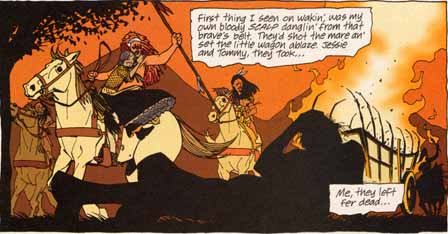 Another Stereotype of the Month entry:
Another Stereotype of the Month entry:
 Another Stereotype of the Month entry:
Another Stereotype of the Month entry:
October 22, 2002, 9:15 a.m.
Lost in Translation
Bilingual voting and the South Dakota Senate race.
By Jim Boulet Jr.
A corrupt home-plate umpire can easily decide the outcome of any baseball game. A few corrupt translators can just as easily decide the outcome of South Dakota's Senate race (and perhaps control of the U.S. Senate), thanks to that state's Indian reservation voter-registration scandal.
Fact one: Many Indian languages lack written alphabets. This means their bilingual ballots are actually cast via oral translation. Fact two: Every aspect of the voter-verification process can be conducted via translation, if only the voter's "translator" makes such a request.
Given these two facts, all anyone needs to sway this year's South Dakota Senate race is a list of fraudulently registered Indian voters, a willingness to round up a few Indians and a bus to bring them to a polling place. The person with the registration list then claims to be translating for each person in the group and helps them cast their ballots for the candidate of his choice under the names registered earlier.
The same group can then repeat the process at will at other polling places because, thanks to voter registration via mail, no election official has actually laid eyes on the new registrants prior to Election Day.
Unless someone at the polling place understands the language and is willing to blow the whistle, this kind of vote fraud is astonishingly easy to accomplish.
Of course, one does not need to corrupt the registration process, as has happened in South Dakota, in order to steal an election. One need only corrupt a few translators into repeatedly giving misinformation to election officials: "He said he would like to vote for every Democrat on the ballot."
Translation errors, either honest or otherwise, were attested to by U.S. Assistant Attorney (under Bush I) General John Dunne at a 1992 congressional hearing on bilingual ballots:
[E]ven when translators were available, the message conveyed to minority language voters often did not resemble the issue on the ballot and it was impossible for a minority language individual to cast an informed vote.

Thankfully, the ability for interested parties to contaminate the election process via translation trickery or vote-fraud schemes may well be reduced after this election, thanks to the efforts of Senator Kit Bond (R., Mo.) to amend the Election Reform conference report (H.R. 3295).
Bond successfully fought for inclusion of an ID requirement for first-time voters who register by mail. In addition, future voter-registration applications must include a question asking if a person is indeed "a citizen of the United States of America."
These minor protections against wholesale vote fraud provoked strenuous complaints from both the Mexican American Legal Defense and Education Fund (MALDEF) and the National Council of La Raza. Their overreaction begs the question of whom such groups actually represent. Law-abiding U.S. citizens of Hispanic descent do not benefit by having their votes canceled out by cheaters.
Senator Bond has clearly made it "harder to cheat" at the polling place. But so long as bilingual ballots remain part of the election process, there will always be possibilities for vote fraud.
— Jim Boulet Jr. is executive director of English First.
Rob's reply
Fact one: The vast majority of Indians speak English. Fact two: Those who don't are extremely unlikely to vote in a non-Indian election.
Note that Boulet doesn't give any evidence that Indians have tried to cheat the system by the method he suggest. Nor does he even try to quantify how many Indians would be in a position to cheat the system. One busload? Given that tens of thousands of ballots were questioned in Florida in 2000, a busload is a drop in the bucket. No doubt there are already registration irregularities that dwarf this imagined irregularity.
This hypothetical problem, which might involve handful of Indians at most, is hardly worth a column in a newspaper. It's a lot less likely to happen than some Republican functionary eliminating legitimate voters from the rolls. Oops, that actually happened in Florida. Is it happening in South Dakota also? Who knows? Let's write a whole series of articles speculating that it might be happening.
This op-ed piece is nothing more than a scare tactic to raise the age-old fear of Indians once again. "Look out, the illiterate savages are coming! Man the barricades! Lock up your women and your ballot boxes!"
Related links
Uncivilized Indians
Savage Indians
|
. . . |

|
All material © copyright its original owners, except where noted.
Original text and pictures © copyright 2007 by Robert Schmidt.
Copyrighted material is posted under the Fair Use provision of the Copyright Act,
which allows copying for nonprofit educational uses including criticism and commentary.
Comments sent to the publisher become the property of Blue Corn Comics
and may be used in other postings without permission.